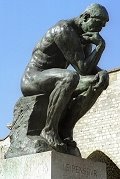It is only a woman that can make a man become the parody of himself.--French Proverb.
Is woman! What a whirlwind is her head!
And what a whirlpool, full of depth and danger,
Is all the rest about her! Whether wed
Or widow, maid or mother, she can change her
Mind like the wind; whatever she has said
Or done, is light to what she shall say or do--
The oldest thing on record, and yet new."
man, the pedant, gleams from books." And, in short, the power and influence of woman have been admirably described by Thomas Otway in his "Venice Preserved" (act i. sc. I):--
To temper man; we had been brutes without you.
Angels are painted fair to look like you"--
Woman has often been said to be equal to any emergency, a German saying expressing this idea thus: "Though an elephant and a tiger come she will leap over them;" and Hindustani lore waxes eloquent on this point--"What cannot a woman do? What cannot the ocean contain? What cannot the fire burn? What cannot death destroy?"
Most Oriental proverbs are much to the same effect, and it is said that "None know the wily tricks of a woman; they will kill their husbands, and then burn themselves," in order to prove their innocence; and again we are told, "Women's wills and thieves' tricks cannot be fathomed." And an old Welsh proverb warns us against the artifices of womankind, for--
Like a woman to betray;"
The minds of these four you cannot know;"
Than a lady's heart and a beggar's purse."
But woe and women can"--
Proverbial philosophy is full of warning against forming hastily an estimate of women's character, for, as the German adage runs, "He must have keen eyes that would know a maid at sight." We are further told that a woman should be seen at home, when engaged in her household duties, to form a clear estimate of her character; and the Danish proverb inculcates this rule: "You must judge a maiden at the kneading trough, and not at the dance."
That two women seldom keep friends for long without quarrelling has long been proverbial, and a Tamil adage remarks that "A thousand men may live together in harmony, whereas two women are unable to do so though they be sisters." And the many ailments to which, under one form or another, women are supposed to be susceptible, have been incorporated into many a proverb like the following: "A mill, a clock, and a woman, always want mending."
It has long been said that there is no accounting for a woman's tastes, and, according to an old English proverb, "A black man is a jewel in a fair woman's eyes;" and, vice versa, we are told that "A black woman hath turpentine in her," a belief which has been told in various ways, an old proverbial phrase quoted by Hazlitt giving this advice--
With a brown man break thy bread;
At a pale man draw thy knife,
From a black man keep thy wife"--
It would seem that, in early times, the fair sex were supposed to have the greater charms, and accordingly they were styled, "Children of the Gods" by the Greeks. In "As You Like it" (act iii. sc. 5), the Shepherdess Phoebe complains of being scorned on account of her being dark--
For what had he to do to chide at me?
He said mine eyes were black and my hair black:
And, now I am remember'd, scorned at me."
Shows that nature gives her grace,"
The pale envious, the dark lusty."
French proverbial wisdom in further enumerating the main features of a woman's character, says that her heart is a real mirror, which "reflects every object without attaching itself to any;" and in Germany, whilst due praise is bestowed on the fair sex, women's varied traits of character have not escaped criticism--one very common maxim affirming that "she is at the mercy of circumstances just as the sand is at the mercy of the wind;" whilst we are further told that, although "woman reads and studies endlessly, her thought is always an afterthought." The Russian is of the same opinion, for, according to him, "a woman's hair is long, but her sense short," and "a dog is wiser than a woman, he does not bark at his master." Tamil proverbial wisdom declares that "the skill of a woman only goes so far as the fireplace"--in other words, cleverness is no use to a woman outside domestic affairs; and the not very complimentary old English adage says, "When an ass climbs a ladder, we may find wisdom in a woman;" whilst another old saying runs, "She hath less beauty than her picture, and truly not much more wit."
In some instances, we find the essential requirements needed to make a good woman laid down, as in an excellent Chinese proverb, which runs thus: "We ask four things for a woman--that virtue dwell in her heart, modesty in her forehead, sweetness in her mouth, and labour in her hands;" with which may be compared a well-known Sanskrit maxim, "The beauty of the cuckoo is the voice, of women chastity; of the deformed learning, and of ascetics patience." On the other hand, under a variety of forms, proverbial literature inculcates the necessity of our remembrance of these four evils thus summed up in the Italian warning: "From four things God preserve us--painted woman, a conceited valet, salt beef without mustard, and a little late dinner." A similar idea is conveyed in the Assamese proverb: "To be the husband of a worthless woman, a cart covering with a hole in the middle of it, a hired weaver--these three are the agony of death." To understand this proverb it must be remembered that "in Assam the bullock cart is covered with a hood made of matting, with bamboo hoops to support it. Any one who has travelled in a bullock cart with a hole in the hood will appreciate its truth."
A trait of character, however, which women are proverbially said to their disadvantage to possess, is a lack of truth and reliability; and, according to an old proverb, "He who takes an eel by the tail, or a woman at her word, soon finds he holds nothing." The popular adage which warns a man not to trust a woman further than he can see her has been variously expressed, one version in Germany being "Arms, women, and books should be looked at daily;" and, according to another, it is said, "Beware of a bad woman, and put no trust in a good one;" which are similar to the Hindustani adage, "A hare and a woman are yours while in your power." The Italians have a maxim to the same effect, "Woman always speak the truth, but not the whole truth," and hence there are the frequent admonitions against trusting womankind, for the French affirm that "he who trusts a woman and leads an ass will never be free from plague;" and, similarly, it is said, "The ruses of women multiply with their years;" and where truth is deficient in a woman there can be no reliance in her word, for, as the Chinese affirm, "An untruthful woman is rotten grass and tangled hemp." But, unreliable as a woman at times may be, we cannot endorse the Turkish maxim, "The dog is faithful, woman never;" which is not unlike the Kashmiri proverb: "A horse, a wife, and a sword, these three are unfaithful;" and Hindu proverbial literature, speaking of woman's insincerity, says that "while the wife is eating her husband's food, she is inwardly singing the praises of her mother."
On the other hand, in defence of woman, it has been urged that good-nature and simplicity of character are liable to imposition, for, as it is commonly said, "All lay load on the winning horse," a version of which is to be found among Sindhi proverbs "A mild-faced woman has her cheeks pulled." We may further compare our own proverbs: "She is as quiet as a wasp in one's nose," and "She looks as if butter would not melt in her mouth;" and, again, "A gentle housewife mars the household"--in other words, through her leniency there is "a want of discipline."
An amusing phrase to denote a proud woman is this, "She holds up her head like a hen drinking water;" and when Herefordshire folk speak of a strong, robust girl, the remark may still occasionally be heard, "She hath one point of a good hawk, she is hardy." When a girl simpers and puts on an affected appearance, in such a way as to excite ridicule and amusement, she is still, in old proverbial phraseology, said to "simper as a mare when she eats thistles," or to "simper like a furmity kettle." An indolent girl is described as "having broken her elbow," and the phrase applied to a woman who grows inactive after marriage is, "She hath broken her elbow at the church-door." The same idea, again, is conveyed in the adage, "She had rather kiss than spin," implying that many a young girl, instead of being industrious at home, would much sooner gad about and play with love; and, if this be not in her power, to use a Somersetshire phrase, "She is as crusty as that is hard-baked."
Chastity, to which references will be found in ensuing chapters, has been universally regarded as an essential necessity for a good woman, for as a popular proverb, current under a variety of forms in most countries, enjoins, "An immodest woman is food without salt;" and a Chinese maxim tells its that "modesty is a woman's courage;" whereas Tacitus wrote in his day, "When a woman has lost her character, she will shrink from no crime." And, where this trait of character is wanting, the consensus of opinion seems to be that no amount of care, or foresight, will prevent a woman going astray; for a Kural saying, too, teaches much the same lesson
Their chastity is women's guard."
There is one thing not to be guarded--a woman."
On the other hand, an Arabic proverb says that "The modest woman's walk lasts from morning till evening," which has been thus explained, "The modest woman rarely goes out, or meets any one, and, when she does get the opportunity to go out, she is as delighted with the various sights as if she were a stranger, and she spends a long time in looking at them, and in chatting with those of her intimate friends whom she meets, so that the length of her absence from the house has become proverbial."
Lastly, due consideration for the frailty of woman is extensively enjoined in proverbial lore, a Tamil adage telling us that "though you see a woman sin with your own eyes, cover it over with earth," for, it adds, "if she says, I am a woman, even the devil will have compassion on her;" and hence a person is sternly warned "not to dare to stand on the earth when passing unjust remarks on a woman." A German proverb says, "Frailty, thy name is woman," which is to the same effect as the Eastern aphorism, "Women, like flowers, are of tender fabric, and should be softly handled;" which coincides with the Indian maxim, "Do not strike, even with a flower, a woman guilty of a hundred crimes," and with the Hindustani proverb, "It is not right to lift one's hand to a woman."
At the same time, our forefathers were strongly of opinion that a certain amount of correction was good for women, an opinion to which we have referred in our chapter on "Woman's Goodness," where we have given some of the proverbial wisdom on the subject. Among Oriental proverbs too much leniency is deprecated, it being said that "the petted boy becomes a gambler, and the petted girl a wanton," which is similar to the Marathi maxim, "By the mother's petting the child becomes an idiot;" and to our own proverbs "A child may have too much of his mother's blessing," and "Mothers' darlings make but milk-sop heroes;" for, says Ray, "Mothers are oftentimes too tender and fond of their children, who are ruined and spoiled by their indulgence." In Hindustani lore we find the same idea expressed, a familiar adage maintaining that, "Melons require the sun, and mangoes want the sun; women need a strong hand, and children want love." The reason for this would seem to be that a woman does not always know what is best for
her, hence the Welsh adage:--
The thing that is the worst for her."
Previous Index Next


















































